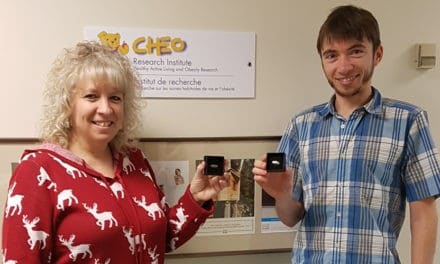The CHEO Research Institute has released their 2010 annual report, which can be downloaded here.
Of particular note, a page in the annual report is devoted to HALO Ph.D. candidate Travis Saunders and his research on sedentary behaviour. From page 10:
“It’s intuitive that sitting is not necessarily good for you. I think what’s surprising for people, and researchers alike, is that it’s bad for you even if you’re otherwise a very active person,” said PhD student, Travis Saunders, a researcher with the Healthy Active Living and Obesity (HALO) Research Group at the CHEO Research Institute. Travis himself uses a pedal machine hidden under his desk or works from a standing position to avoid sedentary behavior – not surprising given his focus.
Sedentary behavior is a distinct class of behaviors (e.g. sitting, watching television, driving) characterized by little physical movement and low energy expenditure; any time that a child is sitting or lying down they are typically engaging in sedentary behavior.
“Right now, according to Canadian guidelines, school-aged kids should accumulate less than 2 hours a day of screen time [computers, video games and TV] – that’s the limit, but we don’t really know exactly how much is okay and how much is too much! It’s still too early to tell,” explained Saunders. “It’s been well established in adults that chronic sedentary behavior has a health impact. But what we don’t know is that if a child sits for even just one day, does that one day have a measurable impact on their health? The policy implications of our findings are huge!”
His is the first study around the world to focus on the acute impact of sedentary behavior in children. The average Canadian child sits about 7½ hours a day so it’s by far the most common behavior that children perform. “If you know that a child has to sit for a long time before you see any problems, you’re not going to worry as much as if you can say ‘one day of doing this has a measurable impact’—it changes how you attack the problem.”
In 2010, both Travis and HALO received a lot of media attention related to this innovative program of research. As his research evolves, he hopes to identify sedentary behavior thresholds for children who show a predisposition for diabetes or cardiovascular disease.
“If most children typically spend only 1-2% of their day being physically active, then HALO exists to better understand the other 98% of their day,” explained Dr. Mark Tremblay, Director of HALO. The CHEO Research Institute is 100% proud that HALO provides national leadership and research excellence in Healthy Active Living and Obesity research for the prevention, management and treatment of obesity and the promotion of healthy body weights in children and youth.



